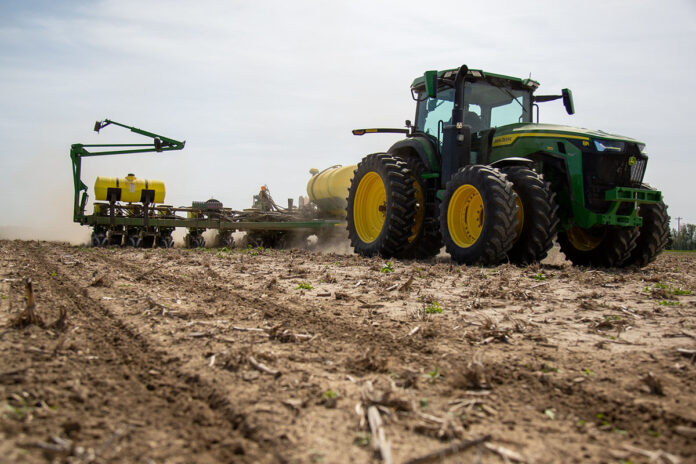Update March 6: President Donald Trump postponed tariffs on most goods from Mexico and Canada on March 6. However, the exemptions expire on April 2,
Imports from Mexico that comply with the 2020 USMCA trade pact are excluded from the 25% tariffs for a month, according to the orders signed by Trump. Potash that U.S. farmers import from Canada for use in fertilizer would be tariffed at 10%, the same rate at which Trump wants to tariff Canadian energy products, according to the Associated Press.
The American Farm Bureau Federation and other ag groups expressed appreciation for the reprieve from the trade war with its North American trading partners but still urged the administration to find permanent resolutions.
This story was updated March 5 at 11:30 a.m.
SALEM, Ohio — National agricultural groups are urging President Donald Trump to restore the flow of trade between its top trading partners before it does irreparable damage to American farmers and rural communities at a time when they can least afford it.
Some farmers still haven’t recovered from the impacts of Trump’s last trade war in 2018, American Soybean Association President Caleb Ragland said in a statement.
“This will further exacerbate economic hardship on our farmers,” he said.
Trump’s long-threatened Tariffs against Canada and Mexico went into effect just after midnight March 4, and existing duties on Chinese goods were doubled to 20%.
Imports from Canada and Mexico are now to be taxed at 25%, with Canadian energy products subject to 10% import duties. Retaliation was swift, with China putting additional tariffs on a wide array of U.S. farm exports, set to take effect March 10.
Imports of U.S. grown chicken, wheat, corn and cotton will face an extra 15% tariff, according to the Chinese government. Tariffs on sorghum, soybeans, pork, beef, seafoods, fruit, vegetables and dairy products will be increased by 10%.
Canadian Prime Minister Justin Trudeau said in a statement that retaliatory tariffs on $20 billion worth of U.S. imports would take effect immediately and another $86 billion in tariffs would follow if Trump’s tariffs were still in place in 21 days.
Mexican President Claudia Sheinbaum said she’ll announce retaliatory tariffs on U.S. goods on March 9.
Soybeans and trade
The American Soybean Association railed against the tariffs, saying they would disproportionately impact its producers. Soybeans are the no. 1 export crop for the U.S., with China being the largest market, Ragland said. About 44% of the United States’ beans were exported to China last year.
Ragland also took issue with Trump’s seemingly flippant response to the impact tariffs would have on farmers. Trump said in a March 3 post on his private social media platform that U.S. tariffs on “external product” would take effect in April, although it was unclear exactly what that meant.
“To the Great Farmers of the United States: Get ready to start making a lot of agricultural product to be sold INSIDE of the United States. Tariffs will go on external product on April 2nd. Have fun!” Trump wrote on Truth Social.
“Farmers are frustrated. Tariffs are not something to take lightly and ‘have fun’ with,” Ragland said, in a statement. “Not only do they hit our family businesses squarely in the wallet, but they rock a core tenet on which our trading relationships are built, and that is reliability.”
Ragland said American soybean farmers are still struggling to overcome the long-term reputational impact of the disruptions from the 2018 trade war. China won’t have to look hard to find somewhere else to get soybeans to avoid American tariffs. The U.S. lost Chinese import ground to Brazil during the 2018 trade war and never recovered. Plus the South American country
Soybean producers in Midwestern states were among those who faced the largest losses from the 2018 trade war, according to U.S. Department of Agriculture research. Pork and sorghum producers also faced heavy losses. Overall agricultural losses from the trade were estimated to be $13.2 billion from 2018-2019.
“Unlike in 2018, farmers are in a more tentative financial situation in 2025,” Ragland said. “Commodity prices are down nearly 50% from three years ago. And, they are operating their farms during a time when costs for land and inputs like seed, pesticides and fertilizer are high, meaning much slimmer margins and less savings to draw from when tariffs make circumstances go south.”
Bad timing
The timing of the tariffs is especially difficult, hitting farmers just as spring planting season is about to begin. Most of the U.S. potash supply — a key ingredient in fertilizer — is imported from Canada.
The Fertilizer Institute President and CEO Corey Rosenbusch urged the Trump administration to provide a “strategic carveout for Canadian fertilizers” from the tariffs through designation as critical minerals.
The 25 percent tariffs on critical fertilizer imports from Canada, including potash, ammonium sulfate, nitrogen fertilizers and sulfur will drive up the cost of production for U.S. farmers. These costs ripple throughout the agriculture community, ultimately leading to higher prices at the grocery store.
Rosenbusch said in a statement that the trade restrictions “will drive up costs for farmers, which could ultimately be felt at the grocery store by consumers.”
“With the spring planting season fast approaching and U.S. agriculture continuing to face serious headwinds, maintaining reliable and cost-effective fertilizer supply chains is essential to ensuring a productive harvest and protecting American farmers from unnecessary financial strain,” Rosenbusch said.
Other groups also urged the administration to work with its trading partners to find a resolution before the impacts hit home, including the National Farmers Union, American Farm Bureau Federation, National Milk Producers Federation and National Corn Growers Association.
Duvall said farmers support ensuring security and fair trade with other nations, but that additional tariffs and retaliatory tariffs will take a toll on rural America.
“For the third straight year, farmers are losing money on almost every major crop planted,” said American Farm Bureau Federation President Zippy Duvall. “Adding even more costs and reducing markets for American agricultural goods could create an economic burden some farmers may not be able to bear.”
BACKGROUND
The Canada and Mexico tariffs were supposed to begin in February, but Trump agreed to a 30-day suspension to negotiate further. The stated reason for the tariffs is to address drug trafficking and illegal immigration, but Trump has also indicated that he wants to correct trade imbalances and push more manufacturing to relocate to the U.S.
“It’s going to be very costly for people to take advantage of this country,” Trump said March 3 at the White House. “They can’t come in and steal our money and steal our jobs and take our factories and take our businesses and expect not to be punished, and they’re being punished by tariffs.”
“It’s a very powerful weapon that politicians haven’t used because they were either dishonest, stupid or paid off in some other form. And now we’re using them,” he continued.










